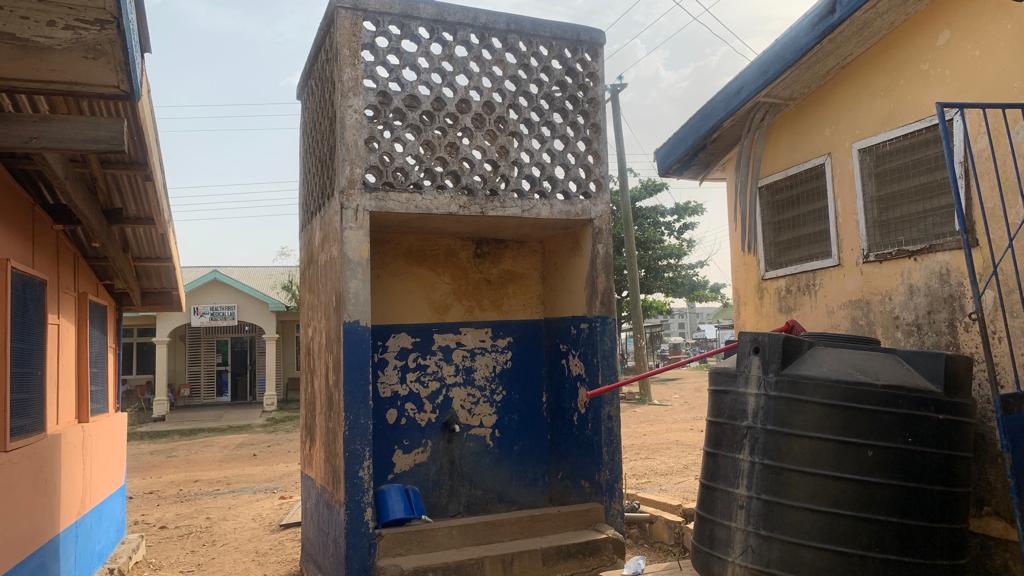In a distressing revelation, some health facilities within the Bolgatanga Municipality of the Upper East Region are facing a critical water shortage, hindering the delivery of proper healthcare services.
Health workers at these facilities are reportedly requesting women in labour or their relatives to buy sachet water for deliveries due to the absence of a reliable water storage system. One of these facilities include the Bolgatanga Health Centre, otherwise known as the Aningazanga Health Center.
Located in the heart of the Upper East Regional capital – Bolgatanga, the facility was established over decades, purposely as a skin disease control centre. But years gone by, the Ghana Health Service upgraded it to provide services such as family planning, ANC services, and general consultation among others.
The Bolgatanga Health Center records over 100 clients at both the OPD and the maternity in a day. The facility depends on water supply from the Ghana Water Company Limited. However, due to the lack of a water storage system, when the taps stop flowing, proper health delivery is hampered.
“As health workers, we use water a lot to deliver health services to our clients. We need to always wash our hands and our instruments properly to control infection. So, if we don’t have a water storage system, it affects us a lot. So, the absence of a water storage system affects our delivery. We used to have a tank but it is broken so help with a water storage system will relieve us of that issue”, a Physician Assistant, Akansise Hawa who doubles as the in charge of the Bolgatanga Health Center spoke exclusively to A1 Radio.
Madam Akansise explained that patients seeking maternity services are particularly affected, as health workers find themselves compelled to ask expectant mothers to provide sachet water for childbirth.
“The service gets halted provided there are no emergencies when there is a need for water, just because we don’t have a storage system to store water anytime the taps are running. Sometimes we ask the clients to buy bags of sachet water. And that is just to manage. Just look at the clients, how much do they have? Sometimes we are forced to buy pure water, sometimes we go to the neighbourhood and beg for water”, she lamented.
Paulina Abane, a resident of Bolgatanga who gave birth at the Bolgatanga Health Center, shared her experience.
“When I arrived at the facility, they told me to buy sachet water for the delivery. It was surprising and inconvenient, but I had no choice. The nurses explained that they face severe water shortages, and patients are required to bring their own water for medical procedures.”
A similar situation can be said about the Coronation Health Center, known by many people as the Plaza Health Center. The scarcity of water is impacting various aspects of healthcare delivery, from routine check-ups to critical medical interventions.
Anthoinite Ayamdoo, the acting in charge of the facility said the absence of regular water supply could lead to infection of patients and the health workers.
“We are dealing with blood. So imagine after conducting a delivery, you will have splashes of blood on the floor, your hands or legs and you don’t have enough water to clean yourself, the client, and the floor to prevent infections. We have instruments that we work with and after delivery, we need to soak them in water with bleach for some time and scrub them before we sterilise them. So when the taps are not flowing, it is always a difficult situation”
Madam Ayamdoo mentioned that the absence of a consistent water supply coupled with the lack of a water storage system has become a daily struggle, forcing healthcare providers to make difficult decisions to ensure basic hygiene standards are maintained.
“There are times the taps are not flowing for more than two days. So when it is like that, it is always difficult. You will see a client coming for labour and you have to let this client go buy bags of sachet water, it is a serious issue”, she stated.
Madam Ayamdoo appealed to corporate organisations, business owners, and the public to come to the aid of the health workers and the clients “with a water storage facility so that when the taps are not flowing, we can rely on that”
Proper hygiene is fundamental to preventing infections and ensuring the well-being of both patients and healthcare providers. Local authorities are being called upon to prioritise the provision of basic infrastructure, including water storage systems, to ensure that health facilities can deliver essential services without relying on patients.
It behoves the government and the public to collaborate to address this pressing issue and safeguard the quality of healthcare in the Bolgatanga Municipality towards assisting Ghana to attain goal 3 of the Sustainable Development Goals by 2030.
A1Radioonline.com|101.1Mhz|Joshua Asaah|Bolgatanga|Ghana







